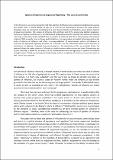Spheres of influence as negotiated hegemony – the case of Central Asia
Abstract
In the nineteenth century, as well as during the Cold War, spheres of influence were created and legitimized to pursue and sustain order in world politics, as well as to avoid direct confrontation between the great powers. Nowadays, they are considered as belonging to a past characterized by confrontation, power politics, balance of power and coercion. Yet, spheres of influence still constitute part of the present-day political vocabulary, and several regional dynamics are in fact framed and analysed by using this concept. Are spheres of influence returning, or have they simply evolved? How do spheres of influence look like in contemporary international relations? With a specific focus on Russia and Central Asia, this article adopts an English School approach to the study of spheres of influence and offers a conceptualization of contemporary spheres of influence as structures of negotiated hegemony between the ‘influencer’ and the ‘influenced’ where norms and rules of coexistence are debated, contested and compromised on. The implications of this are multiple. First, the approach allows for seeing spheres of influence as social structures where norms and rules of coexistence are in play. Second, it allows for an analysis of the implementation and the legitimacy of spheres of influence through history. Third, by stressing the evolutionary character of spheres of influence, it puts the notion of their ‘return’ into question.
Citation
Costa Buranelli , F 2018 , ' Spheres of influence as negotiated hegemony – the case of Central Asia ' , Geopolitics , vol. 23 , no. 2 , pp. 378-403 . https://doi.org/10.1080/14650045.2017.1413355
Publication
Geopolitics
Status
Peer reviewed
ISSN
1465-0045Type
Journal article
Collections
Items in the St Andrews Research Repository are protected by copyright, with all rights reserved, unless otherwise indicated.

